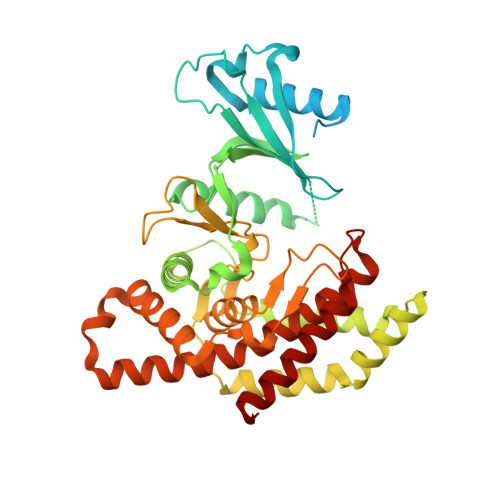Kinetic and mechanistic characterisation of Choline Kinase-alpha.
Hudson, C.S., Knegtel, R.M., Brown, K., Charlton, P.A., Pollard, J.R.(2013) Biochim Biophys Acta 1834: 1107-1116
- PubMed: 23416529
- DOI: https://doi.org/10.1016/j.bbapap.2013.02.008
- Primary Citation of Related Structures:
4DA5 - PubMed Abstract:
Choline Kinase is a key component of the Kennedy pathway that converts choline into a number of structural and signalling lipids that are essential for cell growth and survival. One member of the family, Choline Kinase-α (ChoKα) is frequently up-regulated in human cancers, and expression of ChoKα is sufficient to transform cells. Consequently ChoKα has been studied as a potential target for therapeutic agents in cancer research. Despite great interest in the enzyme, mechanistic studies have not been reported. In this study, a combination of initial velocity and product inhibition studies, together with the kinetic and structural characterisation of a novel ChoKα inhibitor is used to support a mechanism of action for human ChoKα. Substrate and inhibition kinetics are consistent with an iso double displacement mechanism, in which the γ-phosphate from ATP is transferred to choline in two distinct steps via a phospho-enzyme intermediate. Co-crystal structures, and existing site-specific mutation studies, support an important role for Asp306, in stabilising the phospho-enzyme intermediate. The kinetics also indicate a distinct kinetic (isomerisation) step associated with product release, which may be attributed to a conformational change in the protein to disrupt an interaction between Asp306 and the phosphocholine product, facilitating product release. This study describes a mechanism for ChoKα that is unusual amongst kinases, and highlights the availability of different enzyme states that can be exploited for drug discovery.
Organizational Affiliation:
Vertex Pharmaceuticals (Europe) Limited, Oxfordshire, UK.
















